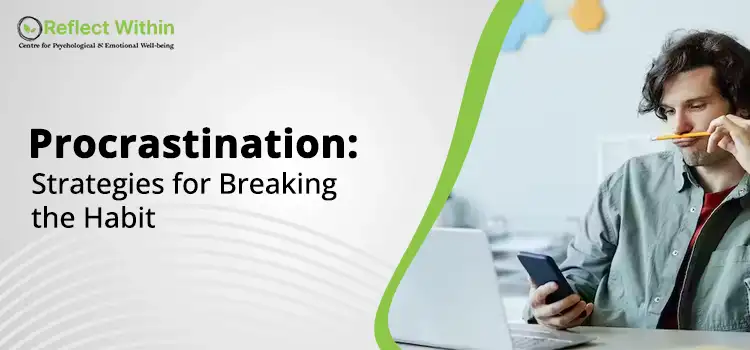Procrastination: Strategies for Breaking the Habit

Do you you struggle to start with work even after you have thoroughly planned it but just getting started with it seems difficult?
You might have seen many motivational speakers on various platforms speaking about procrastination. They provide simple hacks to break this habit. Is breaking the habit of procrastination really this simple?
If you know a bit about the term and need to know more, or you need to get rid of it, you have landed on the right help. Here, we will discuss procrastination in detail, including its underlying causes and the hacks to eradicate it. Here we go!
Procrastination: Defining The Term
Procrastination is a habit that acts against your better judgment. It makes you continue with a less important task rather than start the one that is more important. Thus, you delay or postpone an important task due to its dull or unpleasant nature. It also depicts the lack of self-control.
It’s not that you are not aware of your actions; you are! You may also develop a sense of guilt for the same. Even after having complete awareness, you may fail to leave your existing state. The clock keeps running, and you start to develop the pressure of getting the task accomplished; however, the right course of action is yet missing.
The habit of procrastination can have several adverse effects, such as hampered performance, loss of reputation, and undesired anxiety.
How To Determine Procrastination: Signs and Symptoms
If you want to determine what procrastination looks like, check the below-stated points to enhance your understanding:
- Postponing important things for tomorrow.
- Sitting idly even after knowing the urgency of starting something.
- Taking a longer time to get a task accomplished than required.
- Have planned the task but executing seems difficult.
- Postponing tasks that are boring or frustrating.
- Not starting a task even after having a sense of guilt for the same.
- Not doing work when you have plenty of time and waiting for the deadline.
- Taking excessive time in decision-making requires no mind-storming.
- Not implementing the changes in your routine, although you need and want it.
- Continue doing trivial work instead of doing important work.
- Wasting your days, feeling guilty about it, and continue repeating the same loop.
How To Stop Procrastinating?
1: Break Down Your Task Into Smaller Chunks
Penetrating through a humongous task feels unpleasant and can bring you to the back foot. However, when you decompose your tasks into smaller pieces, it becomes easy for you to get started. The ease it brings can make you start the task. After that, you can move to the next chunk of your plate and finish it.
2: Use Timers ( Pomodoro Techniques)
Pomodoro Technique, can help to enhance focus by breaking work into chunks. Working for 25 minutes and then taking a 5 min break allows for sustained concentration This approach promotes efficiency and can make boring tasks feel more manageable.
3: Make A To-Do List And Carry It With You
If you think conveniently, you are likely to forget the tasks that are dull or unpleasant. However, when you create a to-do list and carry it, you are carrying the tasks in your mind as well. Thus, your mind thinks of those tasks, assesses their urgency, and strategizes the execution. Keep in mind that writing a task on paper and getting it accomplished are two different things. You can also set alarms and reminders to ensure that you are taking proper care of the tasks.
4: Analyse If Your Goals Are Realistic Or Not?
Sometimes, setting unrealistic goals can also make you procrastinate. Besides this, when you attempt an unrealistic goal and fail to accomplish it, you feel detached and lose all interest in it. On the contrary, having realistic goals keeps you focused and accountable for the task. Furthermore, you can boost your motivation level after achieving the task and measure your progress as well.
5: Prioritize Your Tasks Based On Their Urgency
Prioritizing your tasks in the order of most important to least can give you super clarity about your action. You can divide your work into various categories, such as “urgent,” “important yet can be postponed,” “can be delegated to others,” and “not important and can be removed.” When the tasks are free of ambiguity or vagueness, they become easy to attempt.
6: Cognitive Behaviour Therapy
Is procrastination a disorder? It is a deeply ingrained behavioural pattern that results in short-term comfort and long-term cost. Its negative consequences can affect our well-being and are linked to depression, anxiety, low self-esteem, and other mental health issues.
Cognitive Behaviour Therapy (CBT) is proven to be highly effective in the treatment of chronic procrastination and enables the person to achieve their goals. Reflect Within is a highly praised clinic for psychological and emotional well-being. You can avail yourself of the right therapy and counseling to break the vicious cycle of procrastination and become more focused in your life.
Latest Post
Categories
Book Session

















